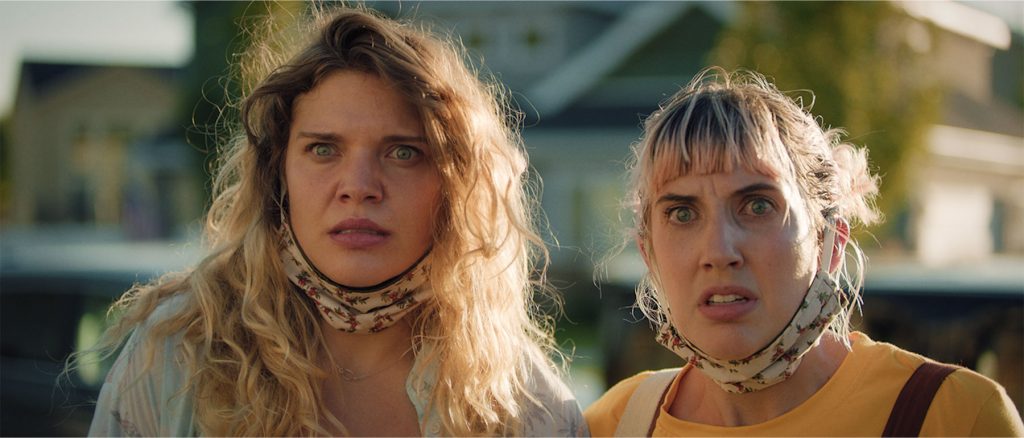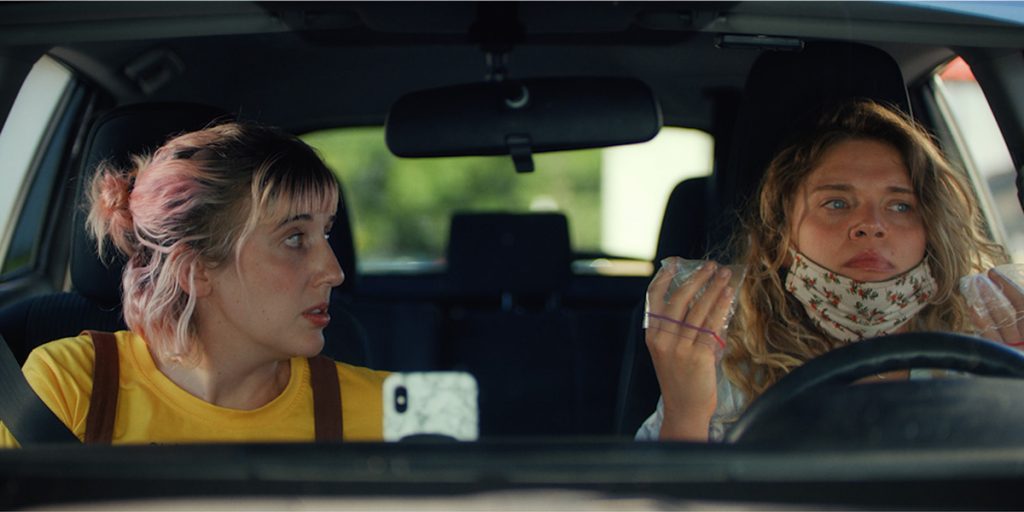Stephen Meek, Mallory Everton, and Whitney Call of the “COVID comedy” Stop And Go share struggles with shooting during a pandemic and the messages of their movie.
After enduring the pains of the coronavirus pandemic for over a year, the world could use some comedy now more than ever. Thankfully, Stephen Meek and Mallory Everton’s Stop And Go, premiering at South by Southwest 2021, has us covered. By straying from solemnity and simply reminding us how to laugh at life again, Stop And Go eschews expectations one may have for cinematic depictions of COVID, taking audiences on a chaotic cross-country adventure with two squirrely sisters who set off to save their grandmother from her nursing home after the virus starts to spread throughout her facility. Everton and Whitney Call (both from the popular sketch comedy show Studio C) lead the film, whilst additionally serving as the sole screenwriters as well, and we were fortunate enough to talk with Meek, Everton, and Call and hear about the perils of producing a film during a pandemic, the artists who inspired them as they shaped their script, and the messages they integrated into their movie.
The Filming of Stop And Go: Struggles Whilst Shooting and the Integration of Improv
Since this movie was obviously made under “unique circumstances,” what were the specific struggles you encountered when shooting during a pandemic?
Everton: There were a lot of struggles (laughs). First and foremost, one of the things that was most difficult about making Stop And Go was how fast we needed to make it. We decided to make the movie in the first place because we were bored and we needed something to do and something to structure our days around, and we thought “making something” might help us. At first, we just thought we were going to be writing a typical screenplay, but when it became a movie that took place during COVID, we were like, “Oh man, we need to get this out to people as fast as possible.” How long were COVID movies going to be relevant? Were people even going to want to watch it? Would people want to barf because they’re so sick of COVID? Would it be triggering? We just didn’t know, so we felt like speed was our friend. Because of that, it was just a brutal, like blistering pace that we took to try and get it into the festivals of that fall, because a lot of their deadlines started off in September and October, and we came up with this idea at the very end of June. So, we did not have a lot of time to make this movie (laughs). That made things really difficult, but I’m still glad we took it at that pace and that we were able to apply to South By.
Call: And while we were filming, we had to keep things so small. First of all, we kept things small for our budget, but also because we just knew that every person we added on set was another liability, and when you didn’t have any access to frequent testing and you couldn’t necessarily just walk into Walgreens and get a 24-hour test, it meant that everyone had to be quarantining and being careful. If we ever did have any extras, we could check their temperature, but unless they’d gotten a test from one of their other jobs, we weren’t sure who was healthy and who was not, so it was kind of like an “Okay, let’s take our masks off and film this scene really quick and then put our masks back on!” situation. It was just such a weird, weird vibe on set, but everyone was in it together, and we all wanted to stay safe, and we all wanted to get this movie done. Luckily, we did both, and nobody got [the virus] while we were filming, so, hallelujah (laughs).
Whitney and Mallory, because you two have such an extensive background in improv, were certain scenes in Stop And Go improvised on set as well, or was the script pretty solidified ahead of filming?
Call: Mallory and I have been making stuff together since we were eight years old, so we’ve got a pretty long history of being able to work together and also just actually being in comedy and sketch shows together and things like that. So, when we were making this movie, we were able to have that foundation already under us. We wrote the script over Zoom for the first half of it (before we “double bubbled” with each other) and we knew that if production was going to be short, we needed all the time we could get. So, we tried to really sharpen [the film’s] scenes by improvising them first and then just tightening them as much as we could in the script. Then, by the time we got to set, we at least had our car scenes down, for example. And then, luckily, by the end of it, we ended up having enough time that we would throw in a few scenes like our “dealbreakers” and other things like that that could end up being improvised.
Everton: It was a healthy mix [of scripted scenes and improv], like Whitney said. We were very nervous at first, because we’d watched Locke – this Tom Hardy movie where it all takes place in a car – and we were like, “We want to make that, but as a comedy.” And how do you do that? How do you keep it fun and flowing while staying in one location the whole time? We were concerned about that, so we had to plan ahead of time to make [our car scenes] as “topically scenic” as possible when writing the script.

The Female Stars and Screenwriters Who Inspired the Story of Stop And Go
In the past, I know you’ve said that Olivia Wilde and Booksmart were major inspirations for Stop And Go – are there any other female filmmakers that you took influence from when you were either directing or writing the film?
Call: We talked a lot about Britt Marling. She’s just a huge inspiration for us, especially because she talks so much about feminine story arcs and how we don’t necessarily need to follow the “masculine hero’s journey” all the time. For years, Mal and I have just been talking about how that’s so fascinating, and we really are starting to see different story arcs come to life in film that aren’t being told in the same way. So, while we were writing this, we knew that we wanted to have a goal, essentially, but we didn’t necessarily think we needed a “dark night of the soul” or some sort of fight between [our characters], because there’s always a fight between the two buddies, and then they reconcile and all that. We thought this could be a quieter narrative, where the story “branches” don’t become a full circle necessarily, and it could just be about our experiences. So, [Marling] is one we definitely pulled a lot from.
Everton: We both have so many influences that we’ve gathered over time from women whose work we really, really love, and I think it’d be impossible for us to not have been influenced by the relationship between Abby and Ilana in Broad City – just how fluid their relationship is and how their friendship feels so real that you feel like you’re a part of it. Early on in the process, we also talked about wanting this movie to feel almost like a podcast, where you’re hanging out with your friends and you feel like you’re having a conversation with them, a lot like Broad City. And of course, in our writing process, we were inspired by the way Kristin Wiig went about writing Bridesmaids as well. I couldn’t possibly list all of the comedy gods that are in our pantheon [of influences], but there are just so many women that we look up and thought of while we were doing this.
Lessons to Be Learned When Watching Stop And Go
What do you hope people “take” from Stop And Go after watching the film? Is there a major lesson or message you hope audiences are left with?
Everton: Going back to that “podcast” approach I mentioned, I think we want people to feel “seen” and connected – like they were hanging out with some friends who understand how they feel. And, since this is, a comedy about “what we have been through” in its DNA, I would also love it if people realize that it’s okay to laugh through hard things. If we can find ways to keep each other laughing, I think that will help the bad times go by faster.
Meek: I think I was really hoping that the movie ultimately comes off as a “catharsis” for everybody. A lot of people seem to have lost somebody they loved [to the virus], and while we did [touch on] those emotions of how overwhelming this has been and how it’s been a really hard time, we also [focused on] a lot of love between these sisters, and I hope that makes people feel more loved and seen and connected after such a challenging year together.
Everton: We wanted this to be a relief to watch, just as it was a relief to make for us. It was a relief to be able to write something that was lighthearted about this time.
Stephen Meek, Mallory Everton, and Whitney Call’s Plans Post-Stop And Go and Post-Pandemic
Looking forward, past the pandemic, what projects are you planning on pursuing in the near future?
Everton: I would just kill to make a movie that I could actually watch in a theater with people (laughs). That would be great. That’s next on my bucket list.
Meek: I think it’ll definitely be comedic, whatever happens next. It’s in our blood at this point with the sketch comedy background we have, as we’ve probably been working in sketch comedy for about a decade now. So, that had to come out in this movie, and I think that it will be an ingredient in every future project too.
Everton: To be fully transparent, we have a lot of ideas and random scripts and things that we’re excited to make, but this experience has been such a whirlwind that we’re still kind of getting our feet under us (laughs).
Stop And Go premiered at the South by Southwest Film Festival on Wednesday, March 17th, at 12:00 p.m. CST. Read our review of Stop and Go.
This interview has been edited for length and clarity.

